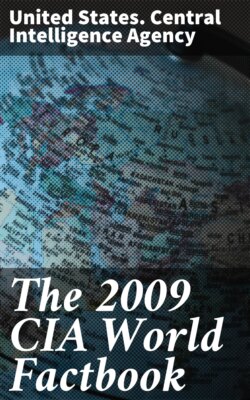Читать книгу The 2009 CIA World Factbook - United States. Central Intelligence Agency - Страница 246
На сайте Литреса книга снята с продажи.
NA%
ОглавлениеElectricity - production:
45 million kWh (2007 est.) country comparison to the world: 198
Electricity - consumption:
41.85 million kWh (2007 est.) country comparison to the world: 198
Electricity - exports:
0 kWh (2008 est.)
Electricity - imports:
0 kWh (2008 est.)
Oil - production:
0 bbl/day (2008 est.) country comparison to the world: 124
Oil - consumption:
1,000 bbl/day (2008 est.) country comparison to the world: 189
Oil - exports:
0 bbl/day (2007 est.) country comparison to the world: 157
Oil - imports:
691.4 bbl/day (2007 est.) country comparison to the world: 194
Oil - proved reserves:
0 bbl (1 January 2009 est.) country comparison to the world: 118
Natural gas - production:
0 cu m (2008 est.) country comparison to the world: 116
Natural gas - consumption:
0 cu m (2008 est.) country comparison to the world: 124
Natural gas - exports:
0 cu m (2008) country comparison to the world: 92
Natural gas - imports:
0 cu m (2008 est.) country comparison to the world: 117
Natural gas - proved reserves:
0 cu m (1 January 2009 est.) country comparison to the world: 123
Current account balance:
$134.3 million (1999) country comparison to the world: 55
Exports:
$25.3 million (2002) country comparison to the world: 202 $25.3 million (2002)
Exports - commodities:
rum, fresh fish, fruits, animals; gravel, sand
Imports:
$187 million f.o.b.
Imports - commodities:
building materials, automobiles, foodstuffs, machinery
Debt - external:
$36.1 million (1997) country comparison to the world: 194
Exchange rates:
the US dollar is used
Communications ::British Virgin Islands
Telephones - main lines in use:
18,900 (2008) country comparison to the world: 196
Telephones - mobile cellular:
23,000 (2008) country comparison to the world: 204
Telephone system:
general assessment: worldwide telephone service
domestic: fixed line connections exceed 75 per 100 persons and mobile cellular subscribership is approaching 100 per 100 persons
international: country code - 1–284; connected via submarine cable to Bermuda; the East Caribbean Fiber System (ECFS) submarine cable provides connectivity to 13 other islands in the eastern Caribbean (2008)
Radio broadcast stations:
AM 1, FM 5, shortwave 0 (2004)
Television broadcast stations:
1 (plus 1 cable company) (1997)
Internet country code:
.vg
Internet hosts:
581 (2009) country comparison to the world: 169
Internet users:
4,000 (2002) country comparison to the world: 206
Transportation ::British Virgin Islands
Airports:
4 (2009) country comparison to the world: 185
Airports - with paved runways:
total: 2
914 to 1,523 m: 1
under 914 m: 1 (2009)
Airports - with unpaved runways:
total: 2
914 to 1,523 m: 2 (2009)
Roadways:
total: 200 km country comparison to the world: 206 paved: 200 km (2007)
Merchant marine:
registered in other countries: 1 (Panama 1) (2008) country comparison to the world: 153
Ports and terminals:
Road Town
Military ::British Virgin Islands
Manpower available for military service:
males age 16–49: 7,101 (2008 est.)
Manpower fit for military service:
males age 16–49: 5,979
females age 16–49: 5,738 (2009 est.)
Manpower reaching militarily significant age annually:
male: 178
female: 173 (2009 est.)
Military - note:
defense is the responsibility of the UK
Transnational Issues ::British Virgin Islands
Disputes - international:
none
Illicit drugs:
transshipment point for South American narcotics destined for the US and Europe; large offshore financial center makes it vulnerable to money laundering
page last updated on October 28, 2009
======================================================================
@Brunei (East & Southeast Asia)
Introduction ::Brunei
Background:
The Sultanate of Brunei's influence peaked between the 15th and 17th centuries when its control extended over coastal areas of northwest Borneo and the southern Philippines. Brunei subsequently entered a period of decline brought on by internal strife over royal succession, colonial expansion of European powers, and piracy. In 1888, Brunei became a British protectorate; independence was achieved in 1984. The same family has ruled Brunei for over six centuries. Brunei benefits from extensive petroleum and natural gas fields, the source of one of the highest per capita GDPs in Asia.
Geography ::Brunei
Location:
Southeastern Asia, bordering the South China Sea and Malaysia
Geographic coordinates:
